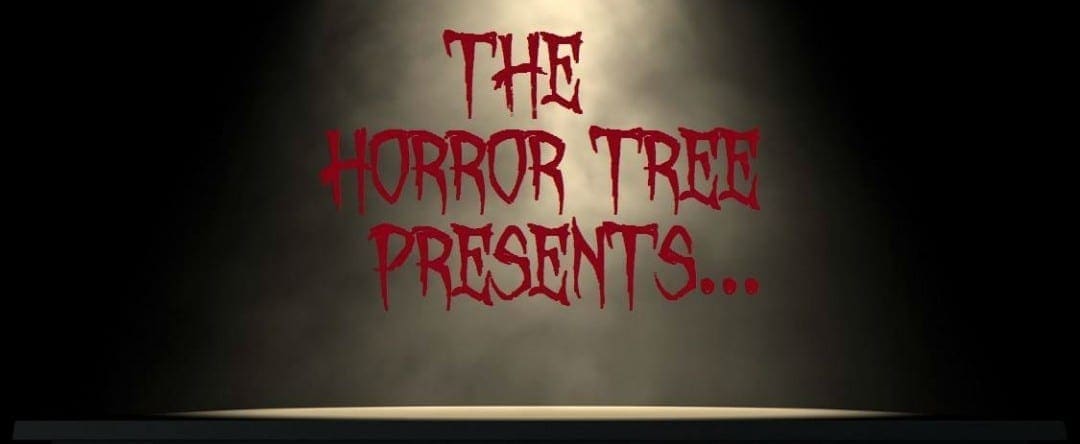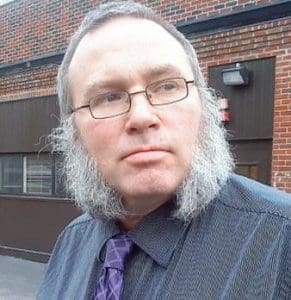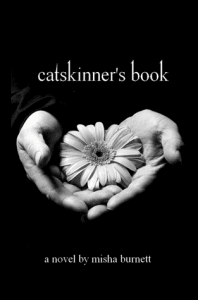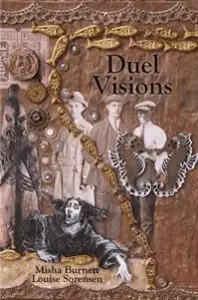The Horror Tree Presents… an Interview with Misha Burnett

 Selene – Welcome to The Horror Tree, and thanks for agreeing to an interview. Tell us a bit about yourself, namely what is New Wave (horror)? I’m familiar with “new wave” in other contexts (New Wave music of the 80s, French New Wave film, New Wave Of British Heavy Metal…), but not pertaining to horror.
Selene – Welcome to The Horror Tree, and thanks for agreeing to an interview. Tell us a bit about yourself, namely what is New Wave (horror)? I’m familiar with “new wave” in other contexts (New Wave music of the 80s, French New Wave film, New Wave Of British Heavy Metal…), but not pertaining to horror.
Misha – I think that the spirit of New Wave is to embrace new techniques in order to go back to one’s roots, which sounds paradoxical, I know. But in the examples you cite—music and film—the idea was to recapture the power of earlier works using modern technology. While the instruments of New Wave music—synthesizers and drum machines—were cutting edge at the time the rhythms and to a certain extent the lyrics were very much roots Rock’n’Roll, 4/4 time with a back beat. New Wave film used modern photographic techniques in order to reach back to the early days of cinema when filmmakers were making it up as they went along.
New Wave Horror is the same principle. I work to recapture the existential horror of the Weird Tales era—not the purple prose or the dated slang of that era, but the feel of a world that has gone off the rails. The core conceit of a universe that is not only stranger than we imagine, but stranger than we can imagine.
Selene – In addition to horror, you have published many short stories in speculative and science fiction anthologies. What genre do you like best, and why?
Misha – I never know what genre I’m working in until the story is finished, and sometimes not even then. I see genres as toolboxes, with different tropes and themes. I’ll use whatever techniques I need to tell the story I want to tell. A little Mystery, a little Romance, some SF and Fantasy. If I had to pick one I’d say I have the most fun working in E C Comics Horror (is that a genre?) I like stories with poetic justice and a healthy dose of irony, that don’t explain or excuse the fantastic elements, just use them to set up the gotcha! at the end.
Selene – What are some of your influences, and what do you like to read?
Misha – Tim Powers is my idol. I’m also a huge fan of Samuel Delany, Philip Dick, George Alec Effinger, and Fredrick Brown. Right now I am listening to (I tend to do my pleasure reading by audiobook) a wonderful little novel by Drew Magary called The Hike. It’s a magical realism quest kind of thing, kind of like of The Phantom Tollbooth for middle-aged men.
Selene – In your blog post “The Dead Men’s Shoes Society,” you describe a pattern in storytelling wherein one man (emphasis on man) writes or films or creates something, then it becomes popular, then others follow in his shoes. Do you really believe there’s nothing new to be done creatively? Particularly since all the “innovators” you mention are white men of a certain class?
Misha – No, I didn’t mean to say at all that there was nothing new to do creatively, and the examples I gave were just those that came to mind. My point is that artist don’t have to imitate other artists. They can, and it’s certainly easier than blazing one’s own trail, but anyone can invent their own genre. I wish more people would.
Selene – You describe your Book Of Lost Doors series as “loosely based on Burroughs’ Nova Express books.” I’m not familiar with Burroughs books, but how do they relate?
Misha – In terms of cosmology. The basic conceit of William Burroughs’ work is that humanity has been influenced by alien intelligences—his famous line about language being a virus from outer space, for example. I wanted to take that idea and run with it, to see if I could translate it into concrete, practical terms. The Lizard People of Omega IV have just started beaming messages into your head—what do you ask them for? The other major influence from Burroughs is the idea that the Outsiders are essentially flimflam artists, they are running an intergalactic scam. They lie, cheat, and steal, and are never what they claim to be.
 Selene – I read the first novel in the series, Catskinner’s Book. You’ve created a unique world and situation; how do you go about world-building?
Selene – I read the first novel in the series, Catskinner’s Book. You’ve created a unique world and situation; how do you go about world-building?
Misha – I tend to take ideas that I like from as many different sources as I can and then toss them all in a blender and see what comes out. In The Book Of Lost Doors I did set out to create a new mythology—I didn’t want to use vampires or werewolves or faeries. The important thing for me is to present them as matter of fact as possible. I don’t believe there is such a thing as a “good idea” in fiction—there are just dumb ideas done well.
Selene – Let’s talk about characters. Jim is sort of an anti-hero, a bit of a twist on a superhero (or super villain, if you look at him that way). How did you come up with the character, and what’s it like writing someone with such complex problems?
Misha – James and Catskinner are based on myself, actually. I have Disassociative Identity Disorder, and I wanted to try to capture the feeling of having an alternate personality take control. I tarted it up some, with the superspeed and all, but I pretty much wrote their interactions from my own life experience.
Selene – You’ve also created some memorable antagonists and foils for Jim. How do you build a believable antagonist?
Misha – A believable antagonist is a character that would be the protagonist except her or his goals are in opposition to the protagonist character. That is to say, what makes a villain isn’t who the character is, but what the character wants.
Selene – On another of your blog posts, you mentioned unlikeable characters, namely the protagonists from Camus’ The Stranger and Fowles’ The Collector, and you cautioned against a predictable character arc for them. Characters in horror can often fall to this kind of simplistic arc. What are some important characteristics for drawing sympathy (or at least empathy) for a character that’s not immediately likeable?
Misha – I don’t know if I can answer that. I try to make everyone in my stories likeable—even those characters who really need to be put down for the good of humanity. I see a character’s first appearance in a story as a date or a job interview—put your best foot forward. And, I think that meeting someone you want to like and then finding out later that she eats live kittens has a lot more emotional impact.
Selene – The plot of Catskinner’s Book is full of twists and turns and the occasional deus ex machina. It also ends abruptly, just as the characters are about to confront another turn. How do you build suspense and avoid predictability?
Misha – I don’t really plot stories out in advance, so the events are frequently as much a surprise for me as they are for my readers. Mostly I try to figure out what would make sense to happen next, given who the character are and what the situation is. I think it comes across as unpredictable because readers are used to stories following a particular pattern which frequently wouldn’t make sense in the real world.
Selene – On your blog, you keep a sort of running tally of words written, stories published or submitted, and other writing accomplishments. Do you find this quantification helps your productivity?
Misha – Yes. Accountability is very important to me. It’s much harder for me to make excuses not to be productive when I know that other people are following my progress.
Selene – Speaking of productivity, how do you balance your writing with other aspects of your time, and balance one writing project against another?
Misha – I don’t really have any other aspects of my time. I get up, write for an hour, go to my day job, come home and write until I go to sleep. That’s my life. I have no social life at all. As far as balancing projects, I tend to work on one until I am done (or decide it needs to be shelved.) I am terrible at multitasking.
Selene – What advice would you give a writer just starting out?
Misha – Try as many different types of projects as you can. Set out to try to work in different forms and different genres. What you think you want to write may not be what you are really good at. Also, write sonnets. If you write a sonnet a day for thirty days your prose will improve markedly. I guarantee it.
Selene – In addition to novels, you also work in shorter stories and poetry. While each length of work has its challenges, what’s your favourite?
Misha – Short fiction. My sweet spot is around 10,000 words, give or take. Long enough to fully flesh out a story, but not so long that I (or my readers) get bored with it.
Selene – This is going to be a personal question, and I’ll accept if you’re not comfortable answering it. You mentioned working with mental illness. Many of our literary heroes have struggled with mental illness, and we live in a time where as a society we’re finally starting to overcome the stigma and be able to talk openly. How do you find your personal obstacles inform your writing?
Misha – I don’t romanticize insanity. Being crazy hurts. There’s more to that than meets the eye. I write characters who are happy and productive in direct proportion to the extent to which their comprehension of reality conforms to the real world—whatever “real” means in the context of the story. If I have a mission in my fiction (which I kind of hope I don’t) it is to put a stake through the heart of Elwood P Dowd.
Selene – A fun question, after a heavier question. If you were to have creative control over a movie of one of your stories, which one would you see made into a film, and who would be the star?
 Misha – I think I’d go with “Black Dog” from Duel Visions, and I’d like to get David Morse to play the lead.
Misha – I think I’d go with “Black Dog” from Duel Visions, and I’d like to get David Morse to play the lead.
Selene – What projects do you have upcoming?
Misha – Right now I am focusing on Bad Dreams & Broken Hearts, which is a short story collection coming out from Lagrange Books. The stories are all set in Dracoheim, which is a Fantasy world loosely based on 1960s Los Angeles, with magic and demons added. My main character is Erik Rugar, who is an agent of the department that regulates magic use. Think The Untouchables, only with unlawful spellcasters instead of bootleggers. I also have stories coming out in Storyhack, DimensionBucket, and Switchblade magazines, as well as three different anthologies.
Selene – Thank you again for agreeing to an interview. Do you have anything else you’d like to talk about?
Misha – I believe that art is a vital part of the human condition. It’s not something that some people do and those people are “artists”. Everybody needs to do it—your soul will shrivel up and die if you don’t create something. It doesn’t have to be something that anyone else will ever care about or even see. You need to do it for you. Finger paint, knit, sing in the shower, do something. It’s what we’re made for.
- About the Author
- Latest Posts
Selene MacLeod is a night operator and sometime writing hobbyist. She holds a BA in Communications from Wilfrid Laurier University and resides in Kitchener, Ontario. Her work has appeared in several horror and crime fiction anthologies, most recently Shotgun Honey, Drag Noir (Fox Spirit Books); and the upcoming Freakshow: Freakishly Fascinating Tales of Mystery and Suspense (Copper Pen Press), and Tragedy Queens (Clash Media).She’s most excited about editing a charity anthology for Nocturnicorn Books called Anthem: A Tribute to Leonard Cohen, due out late 2017.












